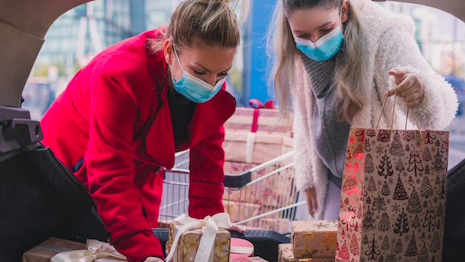 Fifty-two percent of retailers are actively recruiting seasonal staff to a greater extent than in years before. Image credit: Unsplash
Fifty-two percent of retailers are actively recruiting seasonal staff to a greater extent than in years before. Image credit: Unsplash
Retailers’ success during the upcoming holiday season will be primarily determined by their ability to hire and retain labor, according to a new report by Ultimate Kronos Group (UKG).
Per UKG’s “Retail’s 2021 Holiday Season Outlook Executive Report,” the majority of retailers are struggling to retain store associates even as COVID-19 becomes less of a health concern. Retailers must continue actively working to assuage apprehension, as labor shortages left 68 percent of retail stores struggling to meet sales goals this summer and 88 percent concerned about burnout and fatigue entering peak-selling season.
“Retailers need to know it’s not just about compensation,” said Dave Gilbertson, vice president at UKG, in a statement. “It’s about flexibility and showing that you value your associates and are going to keep them safe at work.
“It’s about training and developing your workforce and making sure people feel that they’re starting a career, versus just working day to day.”
The report analyzed survey responses collected between Aug. 31 and Sept. 9 from more than 300 store managers, owners and executives across the United States.
Happy holidays?
Many retailers are attempting to take an optimistic approach to the holiday season, while also being cognizant of the surging labor crisis, supply chain demands and additional challenges.
Fifty-two percent of retailers are actively recruiting seasonal staff to a greater extent than in years before, and 80 percent began actively recruiting seasonal associates well before the holiday surge, including 46 percent who began recruiting before Sept. 1.
 Most retailers said customer expectations are higher than what stores can deliver regarding service. Image credit: Neiman Marcus
Most retailers said customer expectations are higher than what stores can deliver regarding service. Image credit: Neiman Marcus
One in four retailers, 26 percent, expect holiday season staff shortages and unplanned absences to result in daily understaffing. Retailers also cited demands for higher pay and health and safety concerns as the top reasons stores are struggling to attract workers.
Three-quarters of retailers said customer expectations are higher than what stores can deliver regarding service, while 85 percent expect supply chain issues will further impact shoppers. Seventy-eight percent of retailers said they will cross-train employees to work multiple store roles.
Retailers are still maintaining confidence, however, as nine in 10 agree that they will be able to deliver a positive experience for customers, with 53 percent of respondents strongly agreeing and 41 percent somewhat agreeing.
Brands are also actively attempting to make jobs within their organizations attractive, with 63 percent of retailers saying they have raised pay for holiday hires, an average increase of $3.90 per hour, year-over-year.
Seven in 10 retailers also noted making direct, long-term investments in their employees in 2021, with 32 percent having raised wages for at least 10 percent of their workforce, 31 percent having raised starting pay, 28 percent having introduced a new benefit and 22 percent having expanded healthcare or leave benefits.
Other retailers have committed to providing schedule flexibility, job stability and development opportunities.
 Retailers need to make sure both their shoppers and employees feel safe in-store during the pandemic. Image credit: NRF
Retailers need to make sure both their shoppers and employees feel safe in-store during the pandemic. Image credit: NRF
Eighty-four percent of retailers also note that they will try to retain seasonal employees postseason, while 88 percent indicate being worried about possible employee burnout. To assuage this fear, employers will have to be flexible.
“Finding ways to introduce flexibility into frontline work should be a top priority for every U.S. retailer — particularly those hoping to appeal to Gen Z, draw caregivers back into the workforce, and optimize scheduling across multiple stores or brands,” said Rob Klitsch, director of the retail, hospitality and food service practice at UKG, in a statement.
Making safety the priority
For many retailers, the challenge lies with safely welcoming both employees and consumers in physical stores.
The widespread uncertainty spurred by rising cases of the COVID-19 delta variant may be contributing to shifts in consumer behavior.
According to findings from consumer insight platform Resonate, since June, there has been a 44 percent increase in consumers who believe “normalcy” is more than a year away. Additionally, about one-third of shoppers are spending less than they were pre-pandemic (see story).
Thirty-six percent of retailers note that they believe one of the reasons people do not want to work in retail is because they are afraid of getting the COVID-19 virus. About a third report that retail work has been especially grueling during the pandemic.
Ahead of the holiday shopping season, 81 percent of retailers are maintaining contactless systems and in-store safeguards put in place when the pandemic began. Seventy-four percent also said they will require employees to wear masks in stores, while 45 percent said masks are already required for shoppers entering some or all of their stores today.
Whether it is through mask policies or contactless interaction options, retailers taking safety precautions will assuage consumer and employee COVID-19 concerns alike.
After high tensions and increased demands for convenience during the COVID-19 pandemic, beauty group Coty is offering consumers a hygienic and innovative option for fragrance testing. Making the fragrance testing process less wasteful and overwhelming, the device will distribute a single droplet of liquid onto a consumer’s arm or blotter (see story).
“Despite many calls to get back to normal, fears of catching COVID are still real,” Mr. Gilbertson said.
“To quell fears and fill shifts, retailers need to build confidence among potential employees that they will be valued, supported, and protected on the frontlines during the busiest season of the year.”